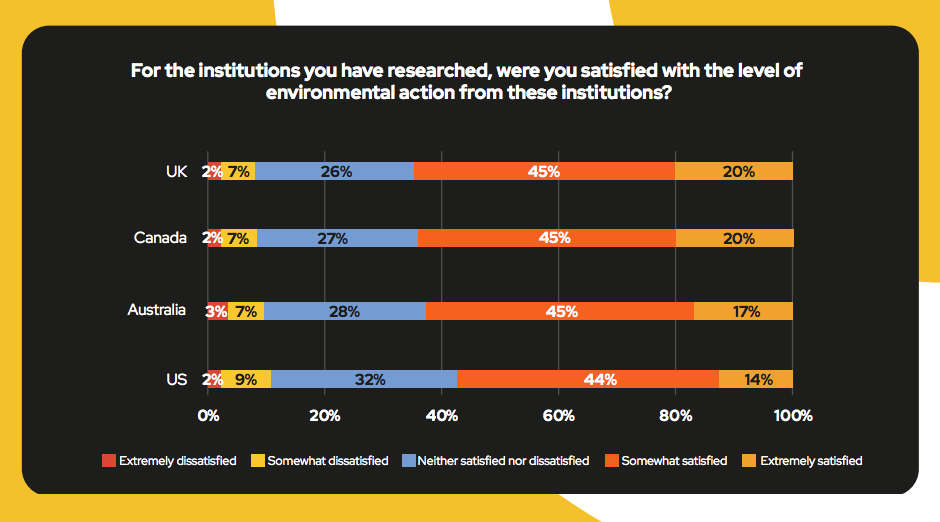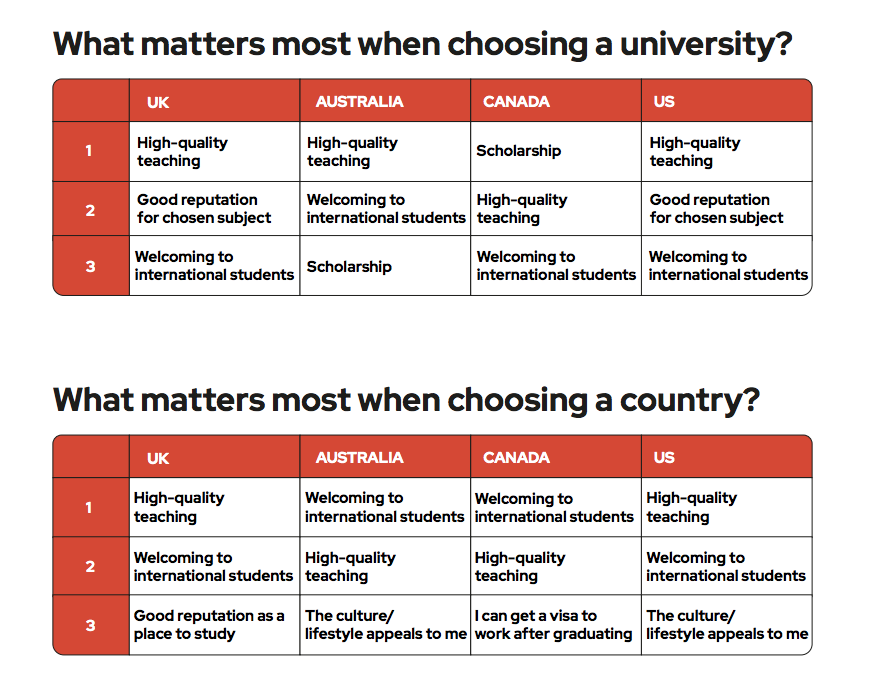Prospective students “actively researching” sustainability strategies
International students seeking options in the UK and the US are continuing to place teaching and reputation at top of mind, while those looking to Canada are interested in tuition fees, scholarships and post-study work visas and career services are important in Australia, new research shows.
But globally, prospective international students are “actively seeking” information regarding environmental sustainability.
This is according to QS International Student Survey, which questioned over 116,000 prospective students from from 194 countries and territories.
In separate reports, the higher education analytics and insight company looked at trends in international student recruitment in the UK, in Australia and New Zealand and the US and Canada. A report focusing on Europe is set to be released later in September.
“The concern that the UK won’t be welcoming to international students has decreased over the past four years”
In each of the papers released so far, the company urges universities to ensure that their environmental sustainability credentials are easy to find for students, while institutions in Australia and New Zealand should feature their commitment to environmental sustainability as a “stand-out message” in marketing.
Among the 43,000 students who said they were interested in studying in Australia or New Zealand, 43% indicated they are keenly looking into universities’ commitment to environmental sustainability.
Postgraduate research students were most likely to say it was important that universities are taking action on environmental sustainability, with 49% saying so. This was followed by 43% of postgraduate taught and 39% of undergraduate students.
It also found that those planning on studying history, philosophy and religious studies were most likely (58%) to research a university’s environmental sustainability strategy and efforts, while psychology students were the least likely, with 26%.
For the 62,000 respondents interested in the UK, 43% were actively researching environmental sustainability strategies at potential options, with 40% of the 47,000+ students interested in the US saying the same.
QS launched a sustainability ranking in 2022 and when it altered its methodology for the QS World Rankings earlier this year, it made university sustainability initiatives 5% of the overall ranking.
The research also identified differences in student perceptions on the levels of action being taken by universities in different study destinations.
In the UK, 65% of those surveyed said they were somewhat or extremely satisfied with efforts being made, the same percentage as Canada, compared with with 62% for Australia and 58% for the US.

Photo: QS
However, the research also pinned down the most important factors for international students to choose study destinations ahead of other options.
While research from recent years has been focused on the availability of face-to-face study as a result of the Covid-19 pandemic, this year’s survey is indicative of pre-pandemic student sentiment.
The Australian edition of the 2019 QS International Student Survey said that an institution’s welcoming attitude was more important than rankings and reputation. More students were also suggesting they had no interest in studying online.
The latest research states that the most significant factor when choosing a study destination is how welcoming it is to international students.
Australia and New Zealand have both “long been perceived as safe and welcoming destinations for international study but the pandemic caused significant disruption”, the report said.
It is therefore “important to continue to highlight the benefits of studying in this region over others, particularly as Canada and the UK have improved their post-study work policies”, QS recommended.
“Affordability is more important to those interested in Canada”
Some 78% of those interested in the UK believed a welcoming environment was most important factor when choosing a town or city, with 62% saying they feel the UK is becoming more welcoming.
“The concern that the UK won’t be welcoming to international students has decreased over the past four years,” the report added, from 38% in 2020 to 32% in 2023.
Among those seeking to study in the US, 49% said the welcome was important when choosing a country and 76% when choosing a town or city. The responses were similar for Canada, where 53% said it was the most important factor when choosing a country and 78% when choosing a city or town.
The report on North America also noted that fewer students are now citing safety as what worries them most about studying overseas, which “could be testament to the work of universities in the US to provide reassurance and support to prospective international students”.
“Unsurprisingly, safety is the biggest concern of parents – with 34% of students saying that safety is their parents’ number one worry about international study,” it added.
Overall the three most important factors when researching where to study centred around teaching quality, reputation and the welcoming environment.

Photo: QS
“Affordability is more important to those interested in Canada with tuition fees, scholarships and post-study work visas all featuring in the top three most important factors when researching where to study. Those interested in the UK and the US hold teaching, reputation and a welcoming environment in similar regard,” QS noted.
“High graduate employment rate for course choice only features in Australia’s top three, though ‘leads to my chosen career’ is fourth for Canada, the US and the UK.”
It also recommends universities to step up with regards to responding to student enquiries.
Some 60% of students looking to study in the UK expect a complete and personalised response to an enquiry within three days.
QS suggests that technology offers options to scale and streamline enquiry, admission, and offer management processes. “Consider the implementation of machine learning and other technological solutions to meet student expectations for prompt responses,” it recommended universities in Australia and New Zealand.
The post Prospective students “actively researching” sustainability strategies appeared first on The PIE News.


